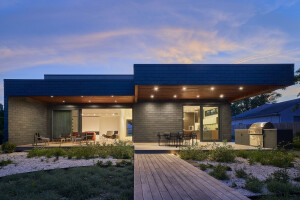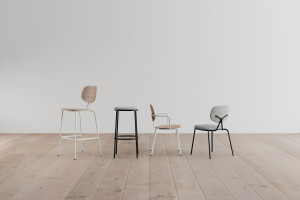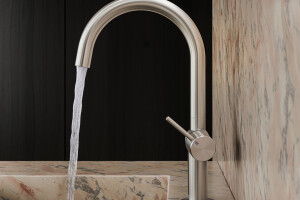On the former site of the Wasser Energie company, the city of Bern has planned a new neighborhood comprising approximately 350 dwelling units, intended to eventually house 500 to 600 residents: Holliger.
On the Holliger U1 plot, we proposed a building in two distinct volumes: a high-rise and a low-rise. This design includes 50 affordable family apartments, available in five types, for a non-profit housing cooperative.
The new urban plan for the Holliger site is organized around a central courtyard. To enliven this space, we decided that all housing types in the lower volume should have their entrances and living spaces connected to this courtyard, resulting in a classic Dutch ‘doorzon’ configuration.


The building is designed to accommodate a variety of family types. To this end, it features an extra-large elevator with ample space for strollers and mobility scooters. The elevator opens onto a generous gallery, which serves as a social meeting place, a play area for children, or an additional balcony, complementing the private balcony on the other side of the apartments.
The three apartment types in the low-rise are enhanced with additional ceiling height by spanning parts of two or even three floors. All types fit together seamlessly, like a jigsaw puzzle. The ground-floor family houses feature a double- height living space that opens onto the garden. Above, there are two linked maisonettes with one-and-a-half-height living spaces, suited for families of varying compositions. By incorporating en-suite rooms, the living space can be easily expanded as needed.


In the tower apartments, emphasis is placed on the perspective from the entrance towards the facade, achieved through the diagonal arrangement of the living spaces. This diagonal theme is further developed in the maisonettes, which feature diagonal lines connecting the two floors.
In both the high and low-rise sections, these typologies are complemented by various “joker” rooms—a typical Swiss phenomenon in residential architecture that adds flexibility. These rooms can function as individual studio apartments or as additional spaces for neighboring apartments, with their use adaptable over the building’s lifespan.


Both the ground floor and the top floor feature communal functions: the ground floor houses a café for residents, while the top floor includes a roof terrace with a garden, play area, BBQ area, and laundry room.
Ultimately, the building integrates Swiss and Dutch perspectives on housing, combining experimental and enjoyable dwelling plans with high-quality materials, controlled aesthetics, and precise detailing.


Team:
Client: Baugenossenschaft Aare Bern
Architecture: FBA Fritschi Beis Architektur + Beyond Space
Project Team FBA:
Ursina Ziörjen (PL), Jan Kolp, Raphael Niklaus, Gianna Erb, Giulia Tomaselli , Claudia Waldvogel (CM), Christophe Kissling (CM), Jonas Fritsch, Beis Hurni
Project team Beyond Space:
Rolf van der Leeuw, Stijn de Weerd, Remi Versteeg, Esther Bentvelsen, Tszo Ho Chau.
Contractor: Metal construction: Huber Metallbau AG, Wood: Zaugg AG Rohrbach,
Concrete: Wirz AG
Engineering: Wood: Indermühle Bauingenieure htl/sia Ing, Weber + Brönnimann Bauingenieure AG
Landscape: Weber + Brönnimann Landschaftsarchitekten AG HLKSE Gilgien, Uhlmann und Partner GmbH
General planner: Fritschi Beis AG
Photography: Beat Schweizer


Materials Used:
Facade: Ediltecnica AG
Windows: 4B AG
Flooring: P+H Parquet + Holzbau AG
Painter: Gipser und Malergenossenschaft Bern
Electro: Aerni Elektro AG



























































